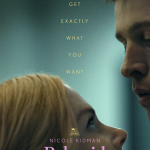A gothic tale of obsession between a haunted young woman and the terrifying vampire infatuated with her, causing untold horror in its wake.
Chuck says:
Among horror film aficionados, Robert Egger’s “Nosferatu” is the most eagerly awaited film of the year. While Werner Herzog’s 1979 remake of F.W. Murnau’s classic was a more grounded approach to the seminal vampire tale, the aesthetic of Eggers previous work promises something different. To say the film is freighted with high expectations is an understatement, as Focus Features have made sure it’s front and center in Oscar voters’ minds, having held it back to be released during awards season.
To be sure, it will likely be recognized for its distinctive look as Eggers, cinematographer Jarin Blaschke and production designer Craig Lathrop pull out all the stops to create a nightmarish world, one in which death casts a pall over every corner, darkness and gloom present in nearly each frame. Equally impressive are the meticulously rendered, dimly lit interiors, the dingy urban environs and, of course, Count Orlok’s dank, shadow-filled castle, all contributing to an oppressive, palpable mise en scene that can’t help but get under your skin.
As for the story, Eggers introduces one interesting innovation, but for the most part, sticks to the basic outline of Bram Stoker’s novel. For the uninitiated, Thomas Hutter (the seemingly ubiquitous Nicholas Hoult) is eager to make good at the real estate firm where he’s employed. So, when its owner, Knock (Simon McBurney) offers him a unique opportunity, he grabs it, eager to make good. Seems the mysterious Count Orlok (Bill Skarsgard) is eager to purchase a property in the German town of Wisborg and insists that he peruse and sign the necessary documents in his Transylvanian home.
Anxious to get started on his journey, Hutter ignores his wife Ellen’s (Lily-Rose Depp) misgivings. Having suffered from dark premonitions from a young age, she’s convinced a dark spirit is calling to her and that her husband’s task is somehow connected to it. Still, he sets out, ignoring the warnings of other travelers and the citizens of a remote village along the way.
Eggers and his crew are firing on all cylinders once Hutter arrives at the castle. Crumbling and decrepit, the entire structure and all it contains appears as if the life has been drained out of it. Compoungin hat, Eggers nurtures our fear and anticipation by offering only glimpses of its inhabitant, Orlok. However, Hoult’s reactions let us know how dire his situation is as well as the grotesque nature of his host. Much like the novel and many other adaptations, this section proves to be the most effective.
Meanwhile, after falling ill, Ellen has moved in with her confidante Anna (Emma Corrin) and her husband Friedrich (Aaron Taylor-Johnson). When her condition worsens and she begins having horrific seizures, Dr. Sievers (Ralph Ineson) is called in to examine her. Quickly realizing he is in need of assistance, he refers her to Professor Albin Eberhart von Franz (Willem Dafoe), who makes a diagnosis none of them expect.
The connection between Orlok and Ellen is developed further than in previous versions and is Eggers’ most significant narrative contribution. A prologue shows her wishing for an angel to look over her, a request that innocently awakens a malevolent force. The bond between her and this spirit increases until it haunts her dreams, slowly creeping into the reality she shares with her loved ones. This perverse attraction ends up having horrifying ramifications as what Ellen has unleashed results in a plague that sweeps through the city, and when the evil force finally contacts Ellen, a dear price is paid be all.
Orlok’s appearance is decidedly different from the iconic Max Schreck make-up, Eggers’ version a more logical one given the character’s history. More grotesque than frightening, his emaciated body is decay personified, the vampire more fetid husk than man. When we finally see him, the character’s thematic import becomes clear though he lacks the horrific appearance necessary to make a true impact.
You’d be hard-pressed to find a more committed cast than the one assembled here. The emotional investment from each is impressive, Depp standing out with a raw performance that reeks of passion and desperation. McBurney revels in Knock’s spiral into madness, while Corrin conveys a sense of confusion and ultimately helplessness that proves poignant. As expected, Dafoe delivers a grand turn in the Van Helsing role, the character’s flair for the dramatic a perfect fit.
As with Eggers’ other films, there’s a great deal to unpack, multiple viewings likely to reveal additional depth and meaning. Having seen it only once, it comes off as a handsome, visual exercise. The problem is, it feels like an exercise, one lacking emotion or purpose. It is surely the most visually arresting version of the story since “Bram Stoker’s Dracula,” but unlike the Francis Ford Coppola classic, “Nosferatu” resembles its titular character in the worst way – it lacks life.
2 1/2 Stars




